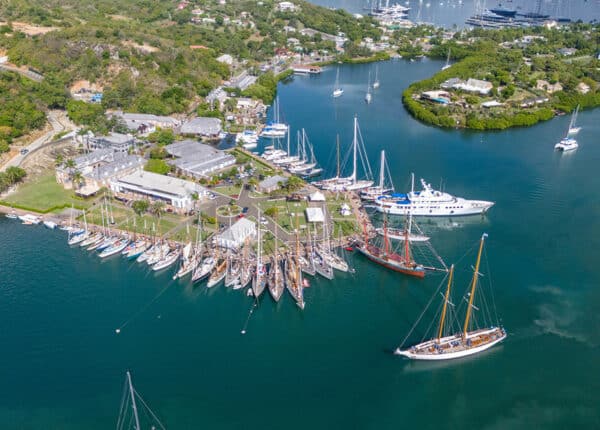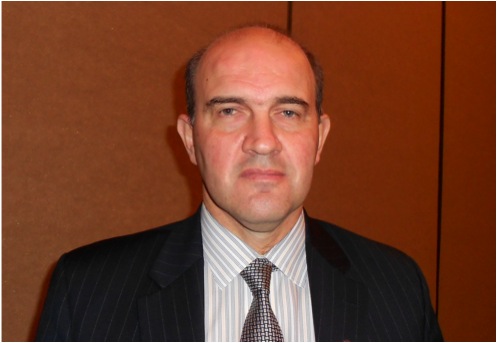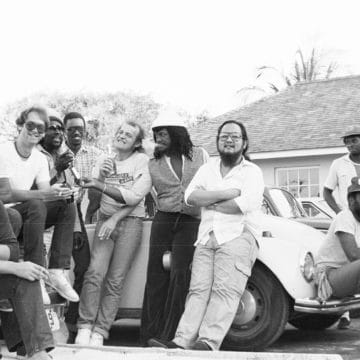Above: Jose Agustin Aguerre (Photo: CJ)
By Alexander Britell
“Haiti is a land of opportunity.” It’s that phrase which Jose Agustin Aguerre, the manager of the Haiti Country Department for the Inter-American Development Bank, hopes becomes the new paradigm for a country long viewed only through the prism of its poverty. The IDB’s work in Haiti has focused largely on disbursing funds for infrastructure and education, from rebuilding the country’s RN8 road to a series of initiatives aimed at bringing hundreds of thousands of Haitian children back into the educational system. To learn more, Caribbean Journal talked to Aguerre at the Inter-American Development Bank’s Haiti Reconstruction Investment Forum in Miami last week about the bank’s work in Haiti, why there is an absence of US firms working in the country and a shift from relief to recovery to opportunity.
How much progress have you seen in the reconstruction and rebuilding of Haiti?
I’ve seen a lot of progress in many different things. I’ve seen progress in infrastructure, in the spirit – and I think that’s very important. I was extremely motivated by the attitude of the new government and the way in which they are ready to show their country with pride, and go around the world presenting Haiti as a country of opportunity. In that sense, President Martelly has shown tremendous leadership, which I hope will continue. On specific programmes, like the infrastructure investments the IDB is promoting funding, we’ve also seen progress, but people shouldn’t confuse the fact that $200 million dollars are available today to $200 million immediately coming into the country. The IDB has been in Haiti for many years – we usually have been disbursing – which means actually transforming the money into goods and services, around $60 million or $70 million per year. In 2010, after the earthquake, in spite of all the problems, we disbursed a total of $187 million, so that’s practically two and a half times what we usually did. This year, we will be closing with $205 to $210 million, so it’s progress. This is a recognition of the Haitian institutions and Haitian authorities – all the programmes the bank funds are done via the Haitian institutions. So every single bid that goes out is done by a ministry, every single contract is signed by a minister. This is the way the bank operates, and I think it’s the best way to do it.
Are there sectors of Haiti that are performing particularly well?
I think all sectors are extremely important. I’m proud of the two projects we’re doing – I think the roads programme and the transport sector are doing. We recently inaugurated RN8, which is the backbone of the Haitian economy, going all the way from Port-au-Prince to, in the near future, connecting Cap Haitien, which is the second city in Haiti. And that is an important road, rebuilt. I think in transport we are seeing a number of things – we are seeing two big, reputed international firms actually building there, and breaking the paradigm of “it’s impossible to do business in Haiti.” They’ve been there, they didn’t have problems with their workers, they didn’t have problems with their machinery, they got their payments on time, they had no legal suits. So this can be done, and we are hoping to see Caribbean firms, US firms also competing for those contracts, which will be for the benefit of them but also for the benefit of Haiti, because today the cost of construction in Haiti is high, due to huge demand and little competition because of little supply.
What else is a strong point?
The other sector I feel particularly proud of is education, which is a huge challenge and is probably the biggest priority. Education today is a very demanding sector, with about 550,000 kids completely out of the system. In Haiti, 85 percent of education is with private schools, with only 15 percent in public schools. And these private schools charge an average of $120 to $140 per year, in a country where the annual family income is around $300. So many families have to choose one of their sons, one of their kids to go to school. Or, some of them are completely out of the system. So yes, education is the priority, and the previous government and the present government both have given great priority to this. We are funding $250 million in grant money for the education programme, and we have also committed to providing an additional $250 million coming from co-financers and partners of the IDB for that programme. So it’s big, it’s ambitious and it’s led by the government. The history of education programmes in Haiti over the last 20 to 25 years is a history of many donors doing very small projects with no continuity and no coordination between them. This time, there’s a big umbrella started by the government and run by the government, where all the donors are putting money under a single script.
In Haiti, 85 percent of education is with private schools, with only 15 percent in public schools. And these private schools charge an average of $120 to $140 per year, in a country where the annual family income is around $300.”
Why are US firms largely absent in Haiti, and how can that change?
I don’t know. We’ve been calling for US firms – I think there’s a big opportunity there. Sometimes when people hear about grant money, they imagine that being grant money, it’s a handout or there’s no need for competition. Probably, the bank has done a good job in explaining how the bank procurement rules operate. But there are huge opportunities, with contracts being put out today, funded by the bank or many other donors. We’re not the only actors there – the US has a very active [donor] presence and activity, and we work well together, but there are some areas where we’re not coinciding. The World Bank has their own funds, and the Canadian government has a lot of resources on the programme. So yes, we would have expected more, but hopefully this will change.
Is there more interest from Latin American firms?
Very much. In Latin America, there is an interest and commitment to funding part of the process – from putting soldiers in Haiti – the main origin of the armies in MINUSTAH comes from Latin America, and the permanent political support and resources and firms coming from Latin America is huge. So this is very good – Haiti was the first country to gain independence [in the region], and it was a source of inspiration for Latin America. Haiti has been the poorest country in the region – but today, Haiti is a land of opportunity, and I’m hoping Latin American governments see it that way.
How much interest has their been from the Caribbean at large?
There’s been few [firms] in the sectors where we are working. I don’t know about in other sectors. I would expect more – I know there is a buoyant construction industry there, and there is great capacity – Caribbean firms are welcome to compete as well for the country.
It seems there has been a paradigm shift from relief to recovery. How much is that something you have been seeing on the ground?
You can see it. The initial months after the earthquake, the obsession was food for the family, the obsession was to give Haitians something to do and to work to gain their own source of living. And then there was a process of starting to rebuild infrastructure and clean the roads, and to make sure you could get from one place to another, and making sure the energy connections were there. Now, we’re beginning a third stage, which is, let’s put the country on its feet again and start to work. That’s a good thing, and that’s where the leadership of the Martelly government is so vital. I think we’re getting into that stage. There are a number of opportunities for actual investment. Someone mentioned that in order to do good, you have to do well, and people are expected to make money and to contribute in that process – to create jobs and start growing the Haitian economy.







